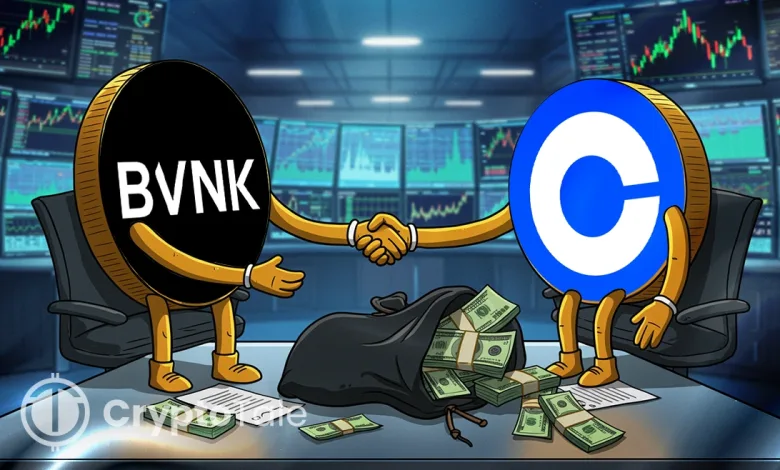Coinbase May Outbid Mastercard for $2.5B BVNK Stablecoin Buyout

- Coinbase and Mastercard are in advanced talks to buy BVNK for $2.5 billion.
- BVNK provides instant settlement tools that make global payments faster and cheaper.
- The deal could shape the future of stablecoin payment systems across the world.
Almost a year after Stripe’s $1.1 billion purchase of Bridge, Coinbase and Mastercard are competing to acquire BVNK, a London-based stablecoin startup. Six sources familiar with the talks revealed that both firms are negotiating to buy BVNK for between $1.5 billion and $2.5 billion. At this stage, Coinbase appears ahead of Mastercard, although a final agreement has not been reached.
The deal, if completed, would become the largest stablecoin acquisition yet. It signals growing competition among global financial and crypto institutions to dominate blockchain-based payments.
Expanding Race for Stablecoin Control
BVNK, founded in 2021 by Chris Harmse, Jesse Hemson-Struthers, and Donald Jackson, helps companies use stablecoins for payments and treasury management. The firm’s tools enable instant cross-border settlements and lower fees than traditional banking networks such as SWIFT.
In December, BVNK raised $50 million at a $750 million valuation, led by Haun Ventures. Other backers include Coinbase Ventures, Tiger Global, and venture arms of Visa and Citi. The rapid funding growth reflects the rising demand for efficient, fiat-backed payment systems.
The acquisition of Bridge by Stripe last year was an example of how traditional fintechs were already integrating blockchain technology into global payments. BVNK is in the same line of business but has more alliances and financial licenses than the others.
According to three sources hinting at the situation, Fortune reported that Coinbase has the “inside track” at the moment, although Mastercard’s interest indicates that the race for stablecoin infrastructure is attracting more players from the mainstream. Will this rivalry determine the company that looks after the infrastructure of the future payment networks?
Mastercard’s Strategic Blockchain Shift
Mastercard’s pursuit of BVNK shows its intent to expand blockchain adoption across regulated markets. The payments giant has already integrated stablecoin payments through its Multi-Token Network. It has also invested indirectly in BVNK via Visa Ventures.
Visa’s Head of Growth Products and Partnerships, Rubail Birwadker, told Forbes that stablecoins represent “the next chapter of global payments.” His comment reflects a broader corporate belief that digital tokens pegged to fiat currencies can reshape international finance.
Mastercard’s shares fell in June after reports that Amazon and Walmart were developing their own stablecoins. The potential BVNK acquisition suggests Mastercard is acting to protect its position amid new competition from major retailers and tech firms.
Related: FCA Lifts Ban, Opening Crypto ETNs to UK Retail Investors
Regulation and Market Growth Boost Adoption
The stablecoin market has drawn heavy institutional attention in 2025. The U.S. Senate passed the GENIUS Act in June, providing a clear framework for stablecoin regulation. The legislation’s goals include promoting transparency and liquidity, as well as protecting consumers—these have become the primary reasons for the rapid adoption of traditional institutions.
Circle Internet Financial’s going public in June 2025 also confirmed the sector’s validity. The analysts point out that these changes have transformed stablecoins into a reliable bridge between the two worlds of finance: the traditional and blockchain networks.
Citigroup, a BVNK investor, predicts the stablecoin market could grow from $250 billion to $4 trillion by 2030. The bank’s July forecast credited improved regulation and demand for instant settlement as key drivers. The announcement of JPMorgan’s own token-based payment system, JPM Coin, is another sign of institutional activity.
With the rise in competition, the BVNK auction may revolutionize the payments sector by integrating cryptocurrency innovation with the power of traditional finance. Whichever company—Coinbase or Mastercard—wins the right to acquire, the outcome may set the direction for the digital payments sector over the next decade.




